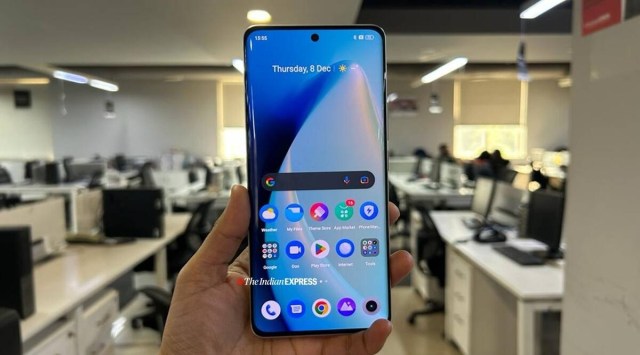Realme to soon resolve the bloatware issue on Realme 10 Pro series
Realme issues a statement regarding the bloatware issue on its 10 Pro series of smartphones and will soon come up with a permanent solution to moderate app recommendations on all its devices.
 Realme will soon come up with a permanent solution to moderate app recommendations on its devices (Image Credit: Anurag Chawake/Indian Express)
Realme will soon come up with a permanent solution to moderate app recommendations on its devices (Image Credit: Anurag Chawake/Indian Express)Realme recently announced its Realme 10 Pro series of smartphones in India. These devices came with an interesting set of features, including a curved AMOLED display, and 108MP primary camera, and shipped with the latest Android 13 OS with custom Realme UI 4 skin on top.
But these devices have received a lot of criticism for bloatware and the type of content that was suggested to users. According to reports, a folder name Hot Apps recommended apps with obscene content and adult content. It should be noted that these apps were not pre-installed on the phones, but rather recommended to users and the apps included adult content. While there is an option to disable these recommendations, one has to do so manually, which could be an issue with users who might not be aware of all the settings and steps required.
Realme has now released a statement regarding the same, and the company said:
“We at realme have taken cognizance of the issue with a few unsuitable app recommendations in the latest realme devices. We take this matter very seriously and are taking strict corrective steps to rectify this error, as we are committed to always delivering the best experience to our users across segments.”
The company said it is aware of this situation and will soon take action to fix this problem. It added that it will screen such apps and even claims that it has blacklisted more than 95 per cent of such recommendations. With this official comment, Realme is expected to release a software update to stop recommending apps with adult content and gambling-related game. In the coming days, the company is likely to ship newer phones with an optimised app recommendation engine on its smartphones.
Why do brands recommend third-party apps?
Gone are the days when phone makers used to make money with only hardware. These days, most phones with custom UI recommend third-party apps and some of the phones even come with a bunch of pre-installed third-party apps. This happens because of the fact that the app maker will pay the OEM to pre-install their apps. This helps both brand (to make extra money) which in return also translate to cheaper phone prices. By doing so, app developers can install their service on a phone without the user’s consent.
Realme is not alone here. Brands like Oppo, Vivo, Xiaomi, Redmi, Poco, Infinix and many other Android smartphone brands are known for pre-installing unwanted third-party apps and cringe app recommendations. Brands like HMD Global, Motorola, and OnePlus are among the few that come with a clean Android user interface with no third-party apps or app recommendations.







